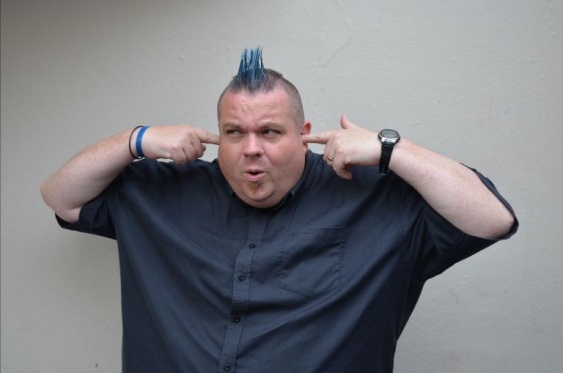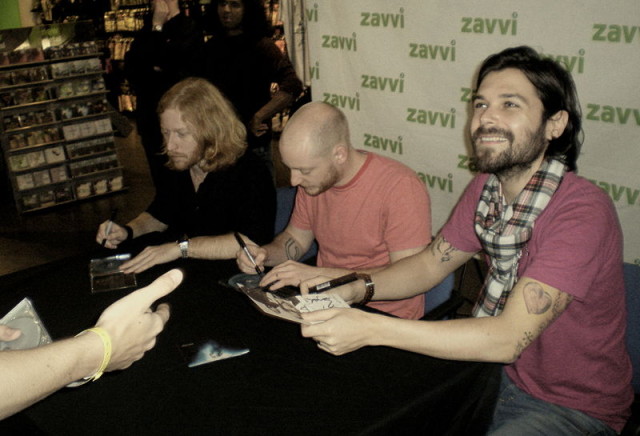
XFM Scotland Drivetime host Jim Gellatly has been responsible for assisting the early careers of the likes of The Fratellis, KT Tunstall and Amy MacDonald by giving them their first radio airplay. This commitment to supporting new musical talent led to him receiving the Radio Academy’s prestigious John Peel Award for Contribution to Radio.
As someone with his finger on the pulse of both the Scottish radio and music industries, we spoke to him to find out more about the opportunities and pitfalls of media jobs.
Can you tell us about your path into the radio industry and have you had any more mundane jobs along the way?
I did a media studies course at Perth College, and then managed to get a 2 week work experience placement at Moray Firth Radio in Inverness. I stayed there for about 3 years! Eventually I was let loose on air, but I did all sorts of roles at MFR, so it was a great training ground. I did work in a record shop in parallel with my radio career for a while, but I’m lucky enough never to have had to get a proper job (yet!).
You champion new music in Scotland and have been involved in the discovery of a number of big names; can you pick out a few favourite examples for us?
It’s such a great thrill to see bands I’ve supported early on make it big. Most recently Twin Atlantic, and prior to that Biffy Clyro. I was the first person ever to play them on the radio, so that’s something that can never be taken away from me. There’s loads of bands that didn’t quite make it. It doesn’t mean they weren’t good bands, just that few folk agreed with me! Chvrches are one of my favourite bands, but I first saw Martin Doherty in a band called Julia Thirteen playing a battle of the bands in Paisley when he was about 17. They were atrocious that night, but actually went on the release a great album. First impressions sometimes need to be cast aside!
The radio world can be a fairly insecure one. Are you conscious of things like networking, keeping abreast of new developments in the field and adding to your skillset to remain one step ahead in the market?
I rarely turn down the chance to speak to students, as one of them might end up being my boss one day! Seriously though, it’s an industry all about networking and making the right contacts. It may be a surprise to some, but I’m actually quite a shy person, without a lot of confidence. I think I manage to hide that well. It’s not been easy making a career out of this, but if you can come across as a decent person it can make a big difference. Sometimes being ruthless can get you places, but that’s not for me.
You’ve also diversified into being a gig host and a columnist (in the Scottish Sun), is there one area of your working life that you feel most passionate about?
I see myself as a “content creator”, so it’s very much a multi-platform thing these days anyway. Everything I do tends to be linked together. It’s good to be able to cross promote over different platforms, especially social media. My passion is for new and emerging music, so I enjoy telling folk about new tracks/acts however I do it.
As well as the success stories, you must have seen a lot of new musicians who don’t quite make the big time. Can you give us an idea of how many of them manage to find another niche in Scotland’s music industry – be it sound engineering, session work, promotions etc?
Even acts that are perceived as “successful” can struggle to make a career out of it, and musicians often have other things to fall back on. Sometimes these other roles can actually help build a career. The live circuit is a lot stronger than the record industry at the moment, but these things change all the time. When I started out, all the major labels had radio pluggers based in Scotland. I think there is now just the one based here, though quite a few independent pluggers. Some jobs can be a foot in the door, while others can help sustain making music as a passion or hobby if you’re not generating enough of a living from your own music. I know loads of gig reps, promoters and managers that I first came across playing in bands but have now put playing music to one side to enjoy successful careers – still to an extent in the creative industries.

[Caption: Biffy Clyro. Just one of the bands that Jim has helped on their way to the big time.]
How do you see the futures of both the Scottish radio and music industries?
The loosening of regulations has meant the introduction a lot of networking in radio. There might be fewer opportunities in traditional radio stations, but it has never been easier to create your own content, especially with platforms like YouTube and Mixcloud. If you can create your own audience with great content, that can actually lead to commissions and media jobs. Digital technology has revolutionised both the radio and music industries. Who knows what will happen in future, but I do think it’s all rather exciting.
Do you have any advice for people trying to pursue a career in radio?
I think I’m only where I am now because I’ve chosen to specialise in new music. I’m not the greatest or slickest presenter, but I have a passion for what I do. Try and make your own content and see what others are doing. If you think you can do it better, there’s no reason why you can’t. Ask yourself why something sounds good, or doesn’t sound good. If you know the difference, that’s a great start. Also, if approaching anybody for advice or possible opportunities, do your research. It’s a very competitive market, so if you seem to know what you are doing and what you’d like to do, it can be a big help.
Thanks to Jim for speaking to us. If you’d like to keep up to date with what he’s up to and with the latest developments on the Scottish music scene then you can find him on Twitter and Facebook.
Biffy Clyro photo by Ilmari Karonen, used under Wikimedia creative commons agreement.

